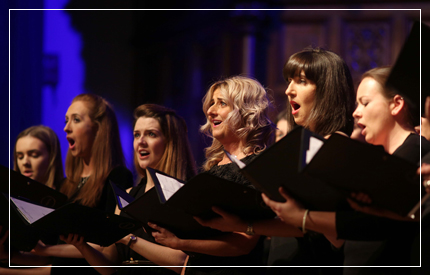Review: Opening Gala Concert, City Of Derry International Choral Festival
Date: 21/10/2016
Gig Review

Blue is the colour of the stage lighting, but not the faces of the audience, at Derry-Londonderry's Guildhall as everyone chats contentedly in anticipation of the city's fourth International Choral Festival. For its positive vibe and strong musicianship, the event has become an undisputed highlight of the Maiden City's cultural calendar since 2013 neared its conclusion. Even today it is hard not to wistfully reminisce about the culture year – and be thankful that part of its legacy will live on in an event rich in creative momentum and communal musicality.
Tonight, a Festival Chorus - a series of singers from all over the city - unite with Donal Doherty's Codetta choir and organist Catherine Ennis to present something that looks back and forward, a celebration of a great composer's work and an exhibition of talent both established and burgeoning. Arguably the essence of what the Choral Festival is about, then - hence the ideal introduction.
The Toccata in B minor, composed by Eugene Gigout, opens the concert on a rather spooky organ note – very fitting for Hallowe'en, no? - before Catherine Ennis, daughter of famed Irish musician Seamus Ennis, takes control, the volume of her instrument rising not to oppress but to command attention. This alert and direct overture is the perfect procession to the compelling and enriching vocals that we will hear.
Both choirs – Codetta and the Festival Chorus – unite for Cesar Franck's Panis Angelicus, a composition which enables all to take note of the soaring sopranos and prominent basses. Consistent and soothing, rather than domineering, this tone is retained in a pair of pieces performed solely by Codetta, James MacMillan's O Radiant Dawn, and Eric Whitacre's Sleep. The former is commendable in its varying pitch and tempo. The latter is strikingly beautiful in its concisely poetic summation of the pleasures of sleep and the discomfort of the wandering mind. Its controlled, concluding background note is brilliant, and a positive sign of things to come from the sopranos and altos.
Gabriel Faure's Cantique De Jean Racine, a sort of prelude to his Requiem, is a personal favourite, its simplistic but rich romanticism demanding and receiving exquisite, moody and delicate vocals with correctly timed soars. Either side of it we hear organ solos of Charles-Marie Widor and Henri Mulet, performed by Ennis, which briefly, seemingly function as a quiet interlude before exploding with passion and physicality, strengthening Ennis's already impressive presence and workrate. The prolonged applause she receives before the interval is well deserved.
The second half is more consistent, dedicated entirely to Faure's Requiem. If, like me, you have performed Mozart's Requiem in a choir, there is a certain joy in comparing and contrasting the power of each composition when performed in a music hall. If you are a newbie, though, you are still in for a treat, a gloomy yet great choral rhapsody cast in blue.
After the pronounced emphasis of Kyrie, the Offertorium presents a distinct vocal split, sweet and smooth sopranos and altos to go with strong and punctuated basses and tenors. Baritone soloist Aaron O'Hare is a strong stage presence, with sturdy vocal control and a powerful projection to compliment and not overwhelm Ennis' accompaniment. With so many voices it is paramount that the sound balance be just right – and it is.
The pitch perfect soprano solo of Grainne Logue adds gentle, operatic romance to Pie Jesu, rightfully eliciting applause from the clearly entranced audience. Logue's presence strengthens in the confidence spreading Agnus Dei, establishing her as a rock, her inspirational melody the centre point of a harmonic whirlwind. As she blends in, O'Hare booms, bringing us to Libera Me, In Paradisum, and a combination of Ennis and choruses which leaves one awestruck at the end of a professional, profound performance of enduring and edifying musical works.
Simon Fallaha
The City Of Derry Choral Festival runs until 23 October. For more information check out codichoral.com.
Photo: Lorcan Doherty Photography
Tonight, a Festival Chorus - a series of singers from all over the city - unite with Donal Doherty's Codetta choir and organist Catherine Ennis to present something that looks back and forward, a celebration of a great composer's work and an exhibition of talent both established and burgeoning. Arguably the essence of what the Choral Festival is about, then - hence the ideal introduction.
The Toccata in B minor, composed by Eugene Gigout, opens the concert on a rather spooky organ note – very fitting for Hallowe'en, no? - before Catherine Ennis, daughter of famed Irish musician Seamus Ennis, takes control, the volume of her instrument rising not to oppress but to command attention. This alert and direct overture is the perfect procession to the compelling and enriching vocals that we will hear.
Both choirs – Codetta and the Festival Chorus – unite for Cesar Franck's Panis Angelicus, a composition which enables all to take note of the soaring sopranos and prominent basses. Consistent and soothing, rather than domineering, this tone is retained in a pair of pieces performed solely by Codetta, James MacMillan's O Radiant Dawn, and Eric Whitacre's Sleep. The former is commendable in its varying pitch and tempo. The latter is strikingly beautiful in its concisely poetic summation of the pleasures of sleep and the discomfort of the wandering mind. Its controlled, concluding background note is brilliant, and a positive sign of things to come from the sopranos and altos.
Gabriel Faure's Cantique De Jean Racine, a sort of prelude to his Requiem, is a personal favourite, its simplistic but rich romanticism demanding and receiving exquisite, moody and delicate vocals with correctly timed soars. Either side of it we hear organ solos of Charles-Marie Widor and Henri Mulet, performed by Ennis, which briefly, seemingly function as a quiet interlude before exploding with passion and physicality, strengthening Ennis's already impressive presence and workrate. The prolonged applause she receives before the interval is well deserved.
The second half is more consistent, dedicated entirely to Faure's Requiem. If, like me, you have performed Mozart's Requiem in a choir, there is a certain joy in comparing and contrasting the power of each composition when performed in a music hall. If you are a newbie, though, you are still in for a treat, a gloomy yet great choral rhapsody cast in blue.
After the pronounced emphasis of Kyrie, the Offertorium presents a distinct vocal split, sweet and smooth sopranos and altos to go with strong and punctuated basses and tenors. Baritone soloist Aaron O'Hare is a strong stage presence, with sturdy vocal control and a powerful projection to compliment and not overwhelm Ennis' accompaniment. With so many voices it is paramount that the sound balance be just right – and it is.
The pitch perfect soprano solo of Grainne Logue adds gentle, operatic romance to Pie Jesu, rightfully eliciting applause from the clearly entranced audience. Logue's presence strengthens in the confidence spreading Agnus Dei, establishing her as a rock, her inspirational melody the centre point of a harmonic whirlwind. As she blends in, O'Hare booms, bringing us to Libera Me, In Paradisum, and a combination of Ennis and choruses which leaves one awestruck at the end of a professional, profound performance of enduring and edifying musical works.
Simon Fallaha
The City Of Derry Choral Festival runs until 23 October. For more information check out codichoral.com.
Photo: Lorcan Doherty Photography





































